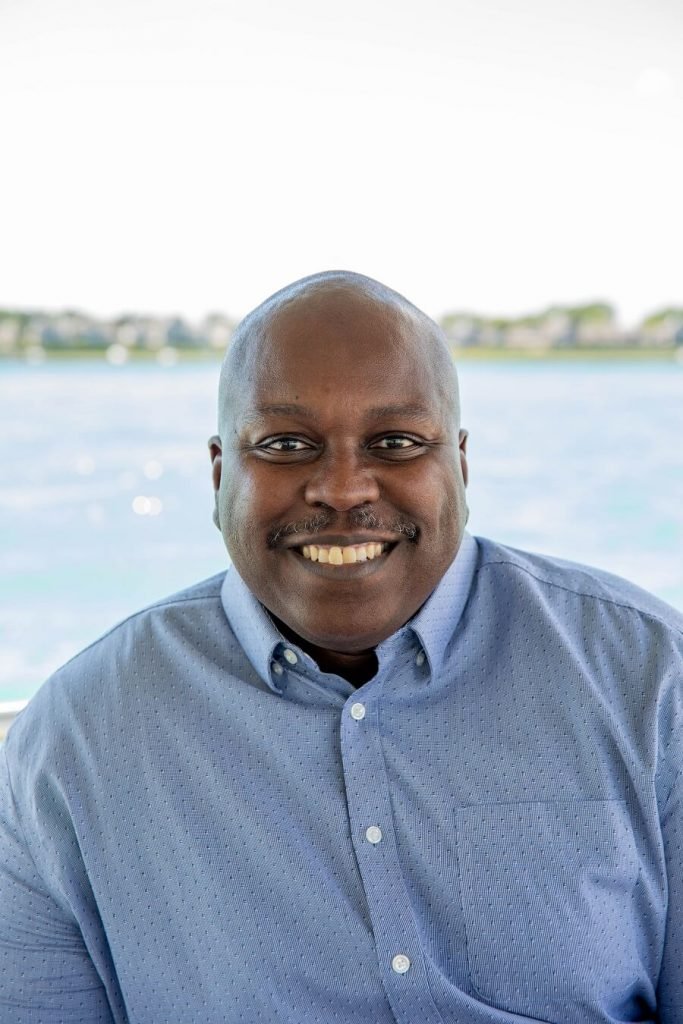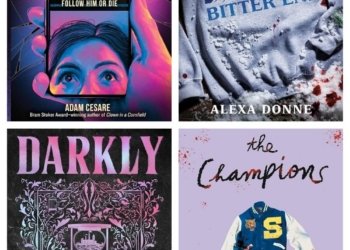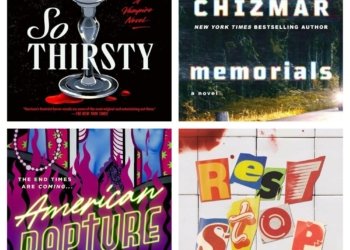No products in the cart.
A Conversation with P.L. Stuart, a Fantasy Author
P.L. Stuart, a Canadian Author of Barbadian and Ghanaian descent, chooses themes based on his personal experiences. He is the author of the Fantasy book series, The Drowned Kingdom Saga.
1.3k
SHARES27.3k
VIEWSP.L. Stuart was born in Toronto, Canada. He holds a university degree in English, specializing in Medieval Literature. P.L. is an assistant editor with Before We Go Blog https://beforewegoblog.com/ , and co-host of the booktube author interview feature PAGE CHEWING https://www.youtube.com/playlist?list=PLw6bQEbZ9ujT45twa4FhQIRqEQS2K6KxA
The Drowned Kingdom Saga chronicles flawed and bigoted Prince Othrun’s journey towards change, and his rise to power in a new world after the downfall of his homeland, which is based on Plato’s lost realm of Atlantis. The Bestselling “A Drowned Kingdom” is mentioned in the esteemed Kirkus Magazine’s 2021 Indie Issue among “Four Great Examples of the Genre” of fantasy and won the 2022 Picky Bookworm Award for Best Indie Book Based on Mythology.
Let’s get started with a quick rapid fire.

Q1. If you could be transformed into one mythological creature, which one would you choose?
I’m going to hazard a guess this is your number#1 answer among your guests who write fantasy: I choose a dragon!
Q2. What time do you usually go to bed at night?
I work shift-work, so that depends. Whenever my shift is done, I come home, and have had time to shower, eat dinner, etc., sometime within a few hours of that, it is bedtime. That could be at 9AM in the morning, if I’ve worked a night shift.
Q3. What are the least-likely three words someone would use to describe you?
Hopefully, people would not describe me as negative, grumpy, or mean. Being positive, upbeat, and kind, I hope is not only natural for me, as I feel that is my personality, and also what I want to project outwardly.
Q4. Where did you go on your last vacation?
Barbados, a tropical Caribbean paradise. Highly recommended.
Q5. Would you rather find your dream job or win the lottery? You can’t do both.
Since I’ve already found my dream job as a writer, even though it’s not my full time job, I’ll say: win the lottery. Winning would allow me, depending on how large the winnings, to write full-time. Thus, I would have both. Is that cheating?
Q6. What is one thing you regret spending money on?
I actually don’t regret spending money on anything. Whatever I purchased was either what I considered a necessity or it was a want that, at the time of purchase, brought at the very least, fleeting joy. I’m not one to have a lot of regrets.
Q7. What object do you misplace or lose the most?
Losing things would drive me crazy so I tend to keep myself fairly organized and my possessions fairly minimal so I don’t normally misplace things.
Q8. If you were a spy, what would be your codename?
Kindness. I think that one would throw people off, haha. You wouldn’t think of a spy with that sort of codename.
Q9. What secret about the universe would you most want to learn?
I’d love to learn if Atlantis, which plays an important role in my writing, ever existed. It’s a fascinating topic for me. “Perhaps I was not the excellent judge of character that I believed.”P.L. Stuart, A Drowned Kingdom
Q10. What never fails to make you laugh?
I’d say my wife. She’s hilarious. Naturally witty.
Q11. What was one “before” and “after” in your life?
The best “before” and “after” is “after” being married to my lovely wife. Life was great “before” but it only improved exponentially “after” I got married to her.
Q12. What do you think people misunderstand about you?
That’s something I honestly have no idea about. I feel I’m a fairly open and simple person, and I love to engage and chat, and appreciate, and try to convey my thoughts, my feelings, what I’m all about, with clarity. I hope I’m not misunderstood.
It’s time for a more detailed conversation, P.L..
You’ve answered our rapid fire brilliantly, P.L.. Now, it’s time for our readers to know more about the person behind the book.
Q. Tell us about your journey.
My journey to become a published author began very early in life, although I published my first novel in middle-age. I always loved writing stories from as early as I can recall, and wanted to write a book, and toyed with the idea at various points of my youth, even partially completing several manuscripts at various junctures in my life. But I had neither the time or the headspace to complete anything. Then in my late forties with most of my children grown or almost adults, and my regular career winding down, I found the time, energy, and sufficient motivation to take writing a book seriously. I am proud to have stayed committed to publishing a book, and my first novel, “A Drowned Kingdom” was released in my early 50s.
Q. So, what books have you read more than once in your life?
There are so many books I’ve re-read I can’t name them all. I am a big re-reader. Most of the books I’ve reread more than any other books are fantasy books. For example, “The Wars of Light and Shadow” by Janny Wurts is my favourite fantasy series of all time, though I haven’t even yet finished the series. Still, I have already re-read the first four books in the series, because I love the series so much. “When one kingdom drowns, a new one must rise in its place. So begins the saga of that kingdom, and the man who would rule it all.”P.L. Stuart, A Drowned Kingdom
Q. Interesting. Who has been the biggest supporter of your writing?
Definitely my lovely wife. She is my business manager, marketing manager, sales representative, social media manager, editor, and a lot of other things that would take many pages to acknowledge properly, and give her credit for. She is my motivation, my inspiration, my rock. I am so grateful for her.
Q. Do you hide any secrets in your books that only a few people will find?
I don’t know if only a few people will find them, but I hide plenty of mysteries about the world I create, including resolutions to prophecies, in what I would consider “plain sight” in my work. Some readers will decipher clues and uncover the secrets, and some won’t, if I did my job properly. Readers are extremely clever people, and it’s difficult to deceive them for any length of time.

Q. Now comes the most anticipated question that every author must answer. How do you process and deal with negative book reviews?
I think as you write more books and gain more experience as a writer, and acquire more reviews overall, negative reviews tend to affect you less. I still read all my reviews, and appreciate people taking the time and effort to read and review my work. If a negative review is constructive, detailed, and comes from a place of trying to inform readers with cogent thoughts about why a book didn’t work for the reviewer, it’s a service to both readers and writers. Because another reader may read that review and all the things that didn’t work for that reviewer may be something that works for someone else. So that review can draw other readers who would enjoy your work to read it. As a blogger and reviewer myself, I feel I am acquiring a better understanding of reviews, both positive and negative, and valuing both more as a writer, as I evolve in my craft.
Q. What comes first for you — the plot or the characters — and why?
Characters will always come first in a story. I’m a character-based reader, and I write the same. Characters, for me, are the whole purpose of telling a story. You can describe an event, and just say “this thing happened”, but without hearing the feelings, thoughts, motivations, about at least one person who was involved in the event, the event can lose some of its impact on the reader. Characters propel a plot forward. In fiction, most novels involve some sort of problem or conflict that requires resolution. That resolution can only come from the characters and their interactions with one another. That said, it’s not like characters and plot are competing elements of a story. Plot is just as important as characters. You can’t convey the ‘what’ of the story, and describe the problems your characters confront without the plot. Plot and characters should coexist seamlessly, in a symbiotic relationship.
Q. How do you develop your plot and characters?
As I noted in the previous response, it all begins for me with the characters. My stories are about “this happened to these characters, and this story is about how what happened to them affects a lot of people, beyond just them.” So in a way, I build OUTWARD from the characters – in this case from one character, my main character, Prince Othrun – and expand the plot. The plot is thus very much about “this is what happened to Othrun” and is told almost entirely from his first person perspective.
Q. You got 100 points. You need to divide them on the basis of how relevant and important they are to you as a reader and a writer for your book or someone else’s as a reader. Your options are Plot/Story, Book Cover, Marketing, and, Reviews.
That question would potentially be answered very differently, for a reader versus a writer. A reader, I think, may initially hear about a book due to how well the book is marketed, check out and be drawn to the cover, peruse the reviews. Then, if they purchase the book and read it, they will read the plot/story and dialogues in the book. The writer normally works from a somewhat opposite end. Nothing happens unless you write the book first. There’s no cover, marketing, etc. without the finished product. Authors write the plot/story and dialogues. They design the book cover. Then they market the book and acquire reviews from those who read it. So, I’ll divide my points from the perspective of a writer. I think for the writer, what is most important is actually writing the book, and what goes in it. So, as a writer, I’d allocate 25 points to plot/story, 25 points to dialogues. But books don’t tend to sell unless they have attractive covers, savvy marketing, and strong reviews. So 15 points for the cover, 20 points for marketing, 15 points for reviews.
Q. So, now, about your book. Talk to us about it. No major spoilers.
I have written three books in the “Drowned Kingdom Saga”. The first is “A Drowned Kingdom.” The second is “The Last of the Atalanteans”. Both these have been published. The third book, “”Lord and King”, will be released in the coming months. “The Drowned Kingdom Saga” is an epic fantasy series. The series chronicles the exploits of my flawed and bigoted protagonist -Prince Othrun. The series examines his journey towards (possible) change, and his rise to power in a new world after the downfall of his homeland, which is based on Plato’s lost realm of Atlantis. The series features a lot of challenging themes, such as racism, misogyny, homophobia, colonialism, and more. I’d say there is a fair share of political intrigue, mysticism, and momentous battle scenes, in the pages of my books.


Q. What part of the book did you enjoy the most while writing?
My favourite parts of writing my books will always be those quiet moments, intimate conversations that reveal something about either the background, personality, or motivation of the characters, or provide insight into a particular storyline. Writing epic battle scenes, love scenes, political intrigue, is all fantastic. But those moments where one finds out why a character is REALLY happy or sad about something, why they REALLY love or hate another character, about why they believe their childhood was terrible or wonderful, and how it impacted them as an adult…those are the parts I really love to write. Because for me, it’s all about the characters.
Q. What is your kryptonite as a writer?
I am not one of those writers who sticks to writing every day, and producing a certain word count. Shift-work, erratic sleeping patterns, etc. mean that oftentimes I do not have the energy to write. That said, when I set deadlines for my work, I have to ensure I’m writing consistently when I am rested and motivated to write (and not get distracted with other tasks) in order to adhere to deadlines. So not writing every day can be my kryptonite, if I don’t push myself a bit to write lots when I am able to, so I can meet my deadlines.
Q. Would you and your main character get along in real life?
Sadly, my protagonist, Othrun, is not someone I’d get along with, or someone I’d choose to associate with. He’s very bigoted, very opinionated, and comes from a place of extreme privilege. I believe he and I are polar opposites, in terms of our outlook and perspective. He’s an unlikable character, and although I feel sorry for him, and although he does have some redeeming qualities, he’s not someone I would choose to sit down and have a meal or a drink with. That said, I’ve met people like Othrun, and have been able to keep things civil with them, if I needed to, for a greater purpose. “No sane man would charge, uphill, into a line of spears, levelled down at them. Suicide. But that is precisely what our knights did.”P.L. Stuart, A Drowned Kingdom
Q. What risks have you taken with your writing that have paid off?
The biggest risk I took with my writing, perhaps, was to end “A Drowned Kingdom”, the first book in my series, on a bit of a cliffhanger. Some people don’t mind cliffhangers, some enjoy them, and some despise them. Some writing instructors will suggest you don’t end speculative fiction books (especially books in a series) on cliffhangers, because there’s the potential for a reader to feel a sense of frustration, or lack of closure. I chose to go against this advice, gambling that the ending would in fact stoke anticipation for the second book in the series. For the most part, this gamble has paid off, and the general feedback from readers thus far is that indeed, the ending of “A Drowned Kingdom” has motivated people to continue with the series.
Q. Let’s talk about the process of writing. Do you do research while writing a book to add more authenticity? What kind of research?
Most of my research consists of ancient warfare and ancient life from the Medieval period. My major in school was English (Medieval) literature, and my minor was History. Because my world is analogous to an ancient period in our history, and depicts what it was like to live – and fight – in those times, most of my research contains those topics.
Q. What was your hardest scene to write?
There is a very poignant, heart-breaking scene in my third book. “Lord and King”, which most people who’ve read it agree, is the most emotive scene I’ve written so far in the “Drowned Kingdom Saga”. It was an extremely difficult scene to write, as it is based on some very tragic real life events. I also wanted to write the scene with appropriate sensitivity. It was very challenging. I hope I did a good job.
Q. Well, this has been great. Now, before we wrap this up, do you have any suggestions to help someone become a better writer? If so, what are they?
Reading voraciously, for me, is one of the primary things which improves my writing. You can learn so much from other authors, simply by osmosis. So read lots, to help improve your writing.
Related Posts
10 Most Anticipated YA Thrillers of Fall 2024
Are you prepared to hear some teenage screams? Here are a few of the most captivating and captivating YA thrillers...
A Conversation with Diane Owens Prettyman, a Romance Author
Diane Owens Prettyman is the author of the romantic adventure story Thin Places and the twentieth-century historical novel Redesigning Emma....
8 Most Anticipated Horror Books of Fall 2024
Now is the perfect moment to create the ideal horror TBR, as fall is rapidly approaching and Halloween and the...
8 Must-Read Spicy Romance Novels of 2024
Warm-blooded romance readers, unite! We've selected the most anticipated books that will be released in the first half of 2024,...
About Us

Trenzle
Where Trends are made and discovered
Trenzle is your official source of discovering the latest people, work, and ideas that deserve to trend. Discover Authors and their books, Creators and their work, People and their opinions, and Stories from around the globe.
Learn more
Latest Posts
Trenzle Top 10 Trending Free Book Deals for December 12, 2024
December 12, 2024
10 Most Anticipated YA Thrillers of Fall 2024
October 30, 2024
Trenzle Top 10 Trending Free Book Deals for October 29, 2024
October 29, 2024
Categories
© 2023 Trenzle - Online Author News & Magazine










